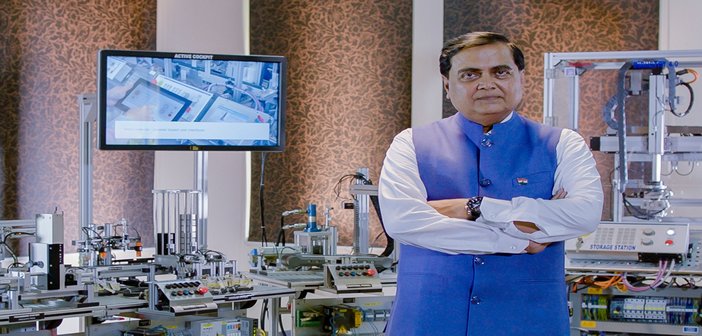Online learning has become the key to continue skilling youth in the time of the COVID-19 pandemic. The entire skilling ecosystem is trying to cope with the crisis using many tools in innovative ways. However, there are many subjects in the domain of skill development that cannot be taught online. Blended model of training is fast becoming the need of the hour! Team NSN spoke to Mr. Sanjib Kumar Rout, Chairman, C. V. Raman Global University, to learn more.
In this Skill Talk, Mr. Rout lays emphasis on taking a long-term view of the challenges and other practical aspects of skilling in a predominantly hands-on learning scenario. Below are a few excerpts from the conversation.
Industry-integrated curriculum with a focus on entrepreneurship
Right from day one, our agenda was to build an engineering college with sustained industry partnership. We’ve already seen the success of this model in many western countries, where practical, hands-on education has not only brought in the industry connect, it has also made students employable. The faculty are also exposed to the latest developments in the industry. Industry exposure and hands-on experience is crucial for the all-round development of the students.
We have designed credit-based programs specially keeping in mind the industry’s demand for skilled professionals. The students can opt for any of the programs as per their interest. This aims to nurture them with the required industry experience. The response from our students is also commendable showing their inclination towards skill development.
The aspirational part of skilling that our university is showing is not limited to traditional education. We build our labs keeping in mind the World Skills standards. Skills and technologies change rapidly and we have to cope with that very quickly. This requires continuous learning and training.
 At our university, we focus on future skills and new age technologies. Let’s take the example of skill-based courses in Water Technology, it is not just about setting up plants, it is about the equipment, involvement of IT, chemical engineering, automation, mechanical and electrical engineering. In other words, it is important to have a multi-disciplinary approach to the course. However, we don’t have skilled trainers and teachers in our country who can commit full time to educate and train our students in similar latest technologies which is why we hire people from abroad. They provide training to our faculty and students.
At our university, we focus on future skills and new age technologies. Let’s take the example of skill-based courses in Water Technology, it is not just about setting up plants, it is about the equipment, involvement of IT, chemical engineering, automation, mechanical and electrical engineering. In other words, it is important to have a multi-disciplinary approach to the course. However, we don’t have skilled trainers and teachers in our country who can commit full time to educate and train our students in similar latest technologies which is why we hire people from abroad. They provide training to our faculty and students.
We emphasize on entrepreneurship and encourage our students to become entrepreneurs. we have startup incubation NIDHI (National initiative for developing and harnessing Innovation) by DST and AIC by AIM(Atal innovation mission). It’s also observed that since most of our students from economically challenged backgrounds, they opt to get a job first to support their families. This also brings in the need to make entrepreneurship aspirational and the need to support innovative ideas and ensure that the students, when adequately backed up, realize their entrepreneurial dreams.
Related article: C. V. Raman College of Engineering – CVRCE’s exemplary curriculum gets India first-ever gold medal at WorldSkills 2019 https://nationalskillsnetwork.in/c-v-raman-college-of-engineering-cvrces-exemplary-curriculum-gets-india-first-ever-gold-medal-at-worldskills-2019/
Need for blended approach and skilling in the time of COVID-19 crisis
Crisis management has always been one of the top priorities for our state, i.e, Odisha, as we often face different natural calamities which impact our entire education system. The COVID-19 pandemic has the same effect. The unexpected situation had unknowingly given a boost to online education. However, there are few challenges that need to be addressed.
- Most of the skilling programs can’t be offered online. Even if they are, all the students can’t benefit from it for different reasons. The students from the challenging backgrounds will have a tough time leveraging the benefits of online learning as they don’t have access to good internet facilities, smartphones and other digital devices.
- Skilling is mostly about hands-on experience. Hands-on experience and practical knowledge are difficult to deliver through online as of now. Engineering curriculum consists of theory as well as practical. Theory can be taught online, the hands on experience can’t be taught through online medium.However, theoretical and conceptual learning is definitely achievable, when delivered in a simple way.
- The current crisis in learning might set a new trend of blended learning which is a combination of offline and online learning where they complement each other.
- Life skills should be taught to students, this can be done online. Acquiring these skills will help them overcome the crisis more confidently.
- This crisis might help us to look into some issues particularly integrating technologies with our learning systems. The technology back-end needs to be improved or else it will not be helpful. It has to be integrated thoughtfully and strategically built into the future.
We have to apply ourselves seriously to the question of how learning and skilling will change in the coming months. The post-COVID world will have even more challenges and the nature of jobs and work may change. It is more important than ever for the entire skilling ecosystem to brainstorm, prepare and take action.













Comments 1